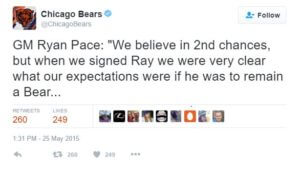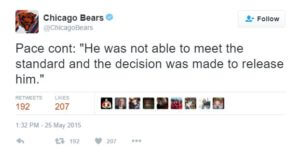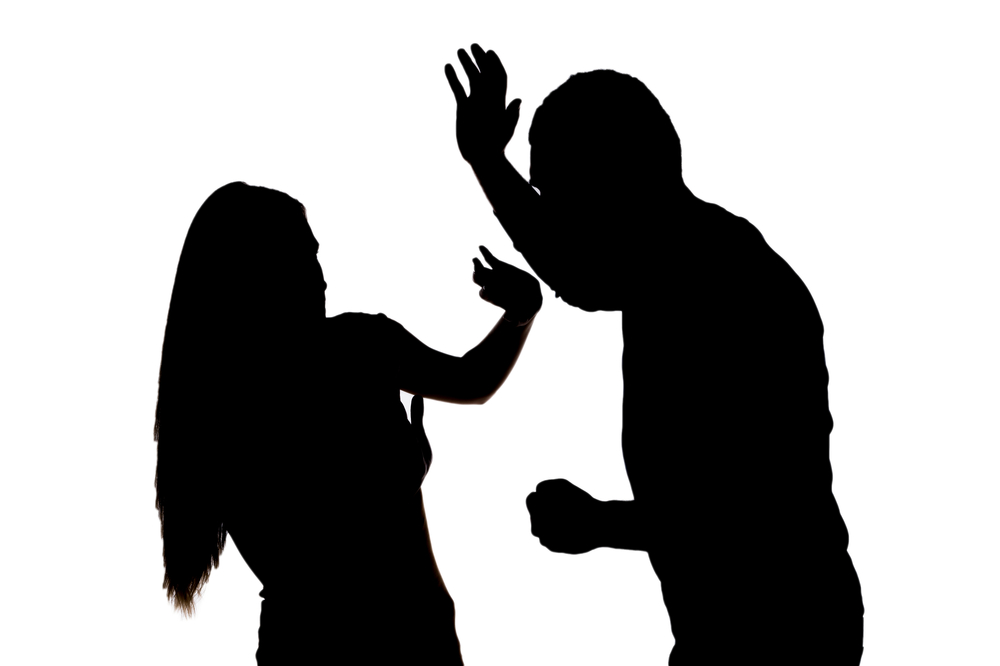Sadly, it comes as no huge surprise another NFL football player was arrested for domestic violence. For some time now, domestic violence has been an increasing problem for the National Football League (NFL). Many advocates to reduce the amount of violence claim the professional football teams are not doing enough to penalize players accused of violence off the field.
Due to this pressure, and significant amount of publicity with violent crime and the NFL, the National Football League recently updated their personal conduct policy to try and address some of the criticism. However, domestic violence by players continues to plague the sport today.
Ray McDonald Dropped from the Bears
The Chicago Bears released Ray McDonald after arresting him on domestic violence charges in Santa Clara, California. McDonald was a major part of the Bears defense strategy for the season, but after this arrest, they chose to let him go.
Police arrested the 30-year-old defensive end after he allegedly assaulted a woman inside his apartment. The incident took place sometime before 4 a.m. on a Monday morning. According to police reports, McDonald allegedly broke down a bedroom door to get to his former fiancée and their infant child. when the police arrived, McDonald was not on the scene.
The Santa Clara police department issued McDonald a restraining order for the protection of his fiancée and child.
However, on Wednesday, police arrested McDonald for a second time in a week for violating the restraining order.
Santa Clara detectives found him in a Togo’s sandwich shop in Santa Clara and booked him in a San Jose jail. He reportedly made bail, for $5,000. According to his attorney, they did not know about the restraining order.
A History of “Poor Decision Making”
This wasn’t the first time the defensive lineman was in trouble with the law. This was his third arrest in 9 months. In August 2014, police arrested McDonald on suspicion of domestic violence. In December of the same year, he was arrested for alleged sexual assault. McDonald defended the sexual assault claims as being consensual and filed a defamation suit. Although the victim did not file criminal charges, the 49ers dropped him from the team, citing “a pattern of poor decision-making.”
Then, the Bears picked him up. Despite his past arrests, based on a solid conversation, the team trusted he would behave. This did not happen. According to the team General Manager, Ryan Pace:
Revised Personal Conduct Policy
In late 2014, the NFL teams introduced a revised Personal Conduct Policy. Aimed at addressing domestic violence and sexual assault, the NFL put their heads together to bring about new order . The hope is this new policy will increase accountability and decrease criminal acts. The policy includes funding for counseling of victims as well as violators as well as provides guidelines for independent investigative procedures.
Unfortunately, even with increased penalties, NFL players continue to break the law. The San Diego Union-Tribune keeps a running tally of arrests and citations involving NFL players. There are exactly 38 recorded arrests for crimes more harmful than a speeding ticket in 2015 alone.
ABOUT OUR CRIMINAL DEFENSE LAW FIRM
We have the best criminal attorneys on hand to answer your calls and walk you through your individual situation 24/7. We do our research so you can rest easy.
#1800NoCuffs
Because no one looks good in handcuffs #unlessyoureintothatsortofthing
http://www.instagram.com/1800nocuffs
Connect with Attorney Darren Kavinoky on Social Media
http://www.twitter.com/darrenkavinoky
http://www.facebook.com/darrenkavinokyfanpage








